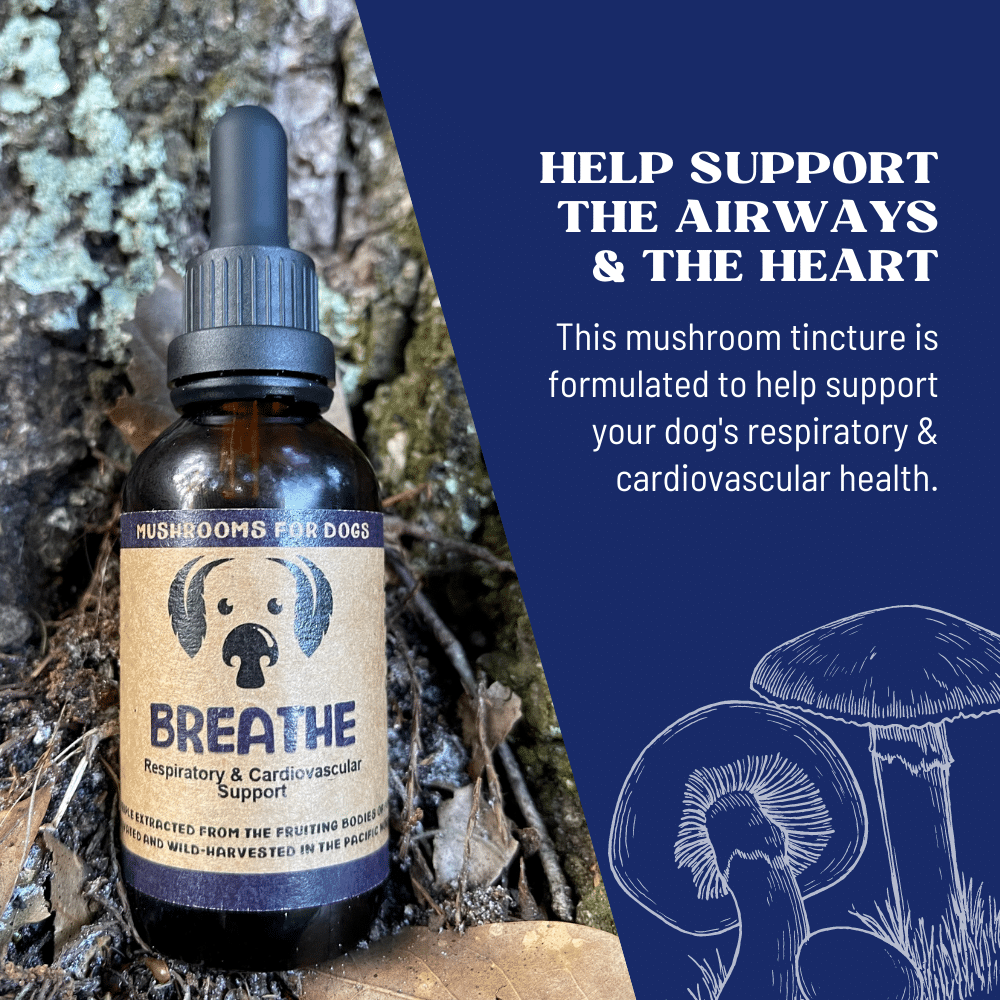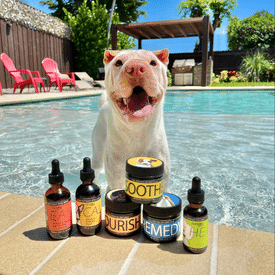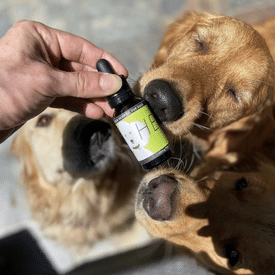CBD Oil for Asthma in Cats

Did you know that asthma is one of the most common respiratory system diseases in cats? It’s true! Just like with humans, cats can develop the same disease process (also usually in response to an environmental allergy) resulting in comparable symptoms and treatment needs. Luckily, there is evidence to support the idea that a full-spectrum hemp extract may have the opportunity to help relieve some of the associated symptoms and even address the underlying condition directly. So, how can CBD oil for cats help?
Table of Contents
What is Asthma?
According to Clinical and Experimental Allergy, Asthma is an inflammation-based disorder of the respiratory system, or “breathing airway.” Symptoms occur when the airway becomes irritated or inflamed as a response to some type of stimulus (usually an allergy of some type) and starts to contract, making it more difficult to breathe. The body then responds by secreting mucous and sending even more inflammatory cells as a defense mechanism. As the cycle continues, the airway becomes more and more affected, oftentimes resulting in a full-on asthma attack.
Without intervention, these attacks can be life-threatening. In addition, chronic inflammation of the airways eventually develops over time, as asthma is usually a life-long condition. In general, most cats will develop early signs of asthma at a young age, with certain breeds like the Siamese and Himalayans being a bit more prone to developing the disease. However, any cat can develop asthma, regardless of breed. It is relatively uncommon for cats to develop asthma the more they approach a senior age, as compared to other respiratory illnesses.
As with humans, feline asthma symptoms and full-on asthma attacks can range from being minor to potentially fatal. Many cats diagnosed with asthma are heavily dependent on pharmaceuticals (specifically steroids) for the remainder of their life, and may also need rescue inhalers at any moment to address attacks.
Cat Asthma Symptoms
If you are concerned that your cat may be experiencing signs of asthma, some of the common signs include the following:
- Wheezing
- Breathing short and shallow
- Appearing to be ‘out of breath’
- Coughing
- Open-mouthed breathing
- Vomiting
Does My Cat Have Asthma?
Your veterinarian must be included to officially determine if your cat has asthma! The vet will review your cat’s history, conduct a physical examination, and search for any additional suggestive signs of asthma. In addition, chest x-rays will be required in almost all situations to confirm the diagnosis of feline asthma. If x-rays come back inconclusive though, further diagnostic investigation may be necessary to rule-out other common causes for breathing changes, before treatment is started.
How To Treat Cat Asthma
The classic western medicine treatment plan for feline asthma usually consists of a combination of oral and inhaled corticosteroids. Most cats are maintained on an oral steroid called Prednisolone, which needs to be taken daily for the remainder of the cat’s life. On days where symptoms are not well-controlled or an asthma attack is suspected, a cat inhaler (AeroKet) is also highly recommended, which can be either one or two types of aerosolized medications (Yes, there are specialized technologies now available to help cats receive the medication they need via a specialized inhaler).
In addition, avoiding or reducing the exposure to an array of common indoor allergens and irritants (i.e. cigarettes, mold, dust, scented candles, plug-in or spray can air fresheners, certain essential oils, perfumes, etc.). are key to minimizing asthma symptoms and attacks for these asthmatic cats.
CBD Oil for Asthma in Cats
There is currently no known definitive cure for asthma in both human and animal medicine. However, the condition can be well-managed in many cases using the conventional techniques listed above. The down-part when it comes to this approach is that long-term steroid use very commonly results in numerous adverse effects on the body. From excessive immunosuppression and increased infection risk, to muscle loss and fat deposition, to hormone dysregulation and more, long-term steroid use comes with a long list of potential adverse effects over time.
However, a full-spectrum hemp extract CBD oil has also been proposed and supported through early research to be an effective adjunct or sole remedy to aid in the management of asthma. Due to its anti-inflammatory effects, bronchodilator influence, and muscle spasm reduction capabilities, CBD shows a lot of promise in asthma patients, cats included.

Studies on CBD Oil for Asthma in Cats
According to the European Journal of Pharmacology, “Cannabidiol, a non-psychotropic cannabinoid component of marijuana (Cannabis sativa), has potent immunosuppressive and anti-inflammatory properties.”
A study published in Future Medicinal Chemistry added, “cannabinoids are components of the Cannabis sativa (marijuana) plant and are known to exert potent anti-inflammatory, immunomodulatory, and analgesic effects through activation of cannabinoid-1 and cannabinoid-2 (CB1 and CB2) receptors located in the central nervous system (CNS) and immune cells, respectively.”
Another study, by researchers in Brazil, found cannabis may reduce hypersecretion of mucus within the airways which is a major symptom commonly associated with asthma in both cats and people. Research has also supports the idea that hemp’s anti-inflammatory properties could assist those with lung injuries further aiding in cases of asthma-related inflammation.
Additionally, a review on the role of cannabinoids in inflammatory modulation of allergic respiratory disorders stated that activation of CB2 receptors on mast cells has direct antiinflammatory effects, causing decreased release of pro-inflammatory mediators by these cells. The activation of CB1 receptors on bronchial nerve endings has bronchodilator effects by acting on the airway smooth muscle and may be beneficial in airway hyperreactivity and asthma.
Related: The Benefits of CBD Oil for Cats
Which is the best CBD Oil for Cat Asthma?
CBD Dog Health’s full-spectrum EASE CBD oil for cats, is formulated with frankincense and turmeric for additional anti-inflammatory support, and may be of great benefit when considering an integrative or holistic approach to managing feline asthma.
It is important to note that the optimal dosage of a full-spectrum CBD tinctures with regards to a pet varies based on several factors, rather than being related to your pet’s weight as would be the case with conventional pharmaceuticals.
Factors that come into play include a pet’s basal endocannabinoid “tone;” additional health conditions the pet has and what medications they have been on or are currently taking; the pet’s age, and more. Therefore, each pet will be a bit different in how they respond and what their unique “right dose” will be.
Our Chief Veterinary Officer, Dr. Zac Pilossoph, and Cannabis Expert, Angela Ardolino, almost always preach the idea of “start low, go slow” when starting out, as to maximize the rate at which each pet can find its optimal dose and start feeling relief.
In addition, CBD carries none of the potential long-term side-effects steroid use can cause. Thus, whether it is used in adjunct to reduce the steroid dose down to its lowest effective dose, or eventually replace it completely in select cases, full-spectrum Ease may have an important role to play in the control of asthma for our kitty family members.
Mushrooms for Cats with Asthma
Medicinal mushrooms can be absolutely life-changing for many pets with respiratory ailments, including asthma, due to their gentle yet powerful anti-inflammatory and infection-fighting abilities.
A lesser-known mushroom called Artist Conk, part of the Reishi family, has a tremendous ability to help open airways and ease congestion and inflammation in the respiratory tract. It has been used for centuries to treat all sorts of respiratory conditions including rheumatic tuberculosis and esophageal carcinoma. It has potent anti-tumor, anti-fibrotic, and anti-bacterial properties. It helps relieve phlegm and also can help with indigestion (common among brachycephalic breeds). This amazing mushroom works even better when combined with other herbs and mushrooms to achieve tremendous synergistic effects.

MycoDog was developed by Angela Ardolino, with her own dogs in mind, but are also safe and effective for cats. This unique blend combines the power of medicinal mushrooms and adaptogens to support respiratory health and alleviate asthma symptoms in feline friends. By targeting inflammation and promoting overall lung function, this tincture provides much-needed relief for cats struggling with asthma.
Final Thoughts
A properly formulated and vetted full-spectrum CBD oil is completely safe for cats with little to no adverse effects. Cats who suffer from asthma may find much-needed relief with the incorporation of a CBD product into their medical management routine. By promoting total body homeostasis, or a state of balance, CBD has the potential to act as an effective remedy for asthma in cats, with the opportunity to impart a reduction in symptoms and disease severity.
If your cat has been medically confirmed to have asthma, it’s important to discuss this alternative with your veterinarian, or pursue a second opinion from a holistic/integrative veterinarian. It is NOT recommended to stop following your current veterinarian’s recommendations before engaging in a discussion with an expert and doing your own extensive research.
















